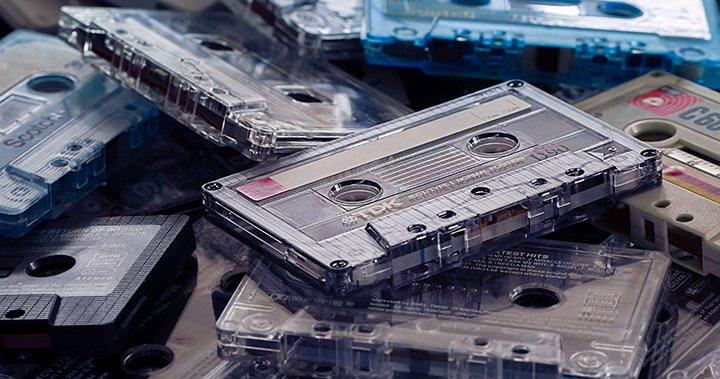People of a certain vintage couldn’t help feel a twinge of sad nostalgia earlier this month with the news of the death of Lou Ottens, the inventor of the cassette.
In the very early 1960s, when working as an engineer on the new product development team at Phillips, the Dutch electronics manufacturer, Ottens had a mishap with an old-school, reel-to-reel machine that saw a bunch of tape uncontrollably unspool on the floor This caused him a great deal of irritation, prompting him to assign his people to come up with a better solution. He set out to build something much more user-friendly.
FROM THE ARCHIVES: Let’s please stop pretending there’s a ‘cassette resurrection’ (Alan Cross, Aug. 26, 2018)
By 1962, working at the offices in Hasselt, Belgium, a goal was set: Could a reel-to-reel mechanism be shrunk to the size of a wooden block that could fit inside a shirt pocket? After another year’s work, the Compact Cassette — two tiny reels inside a plastic case — was unveiled at the Berlin Radio Show (the Funkausstellung) to great amazement.
The audio quality wasn’t great. The tape was just 3.81 mm wide and moved at a glacial 1 7/8 inches per second, originally enough for 30 minutes of recording time per side. But since the vision was to use the new format for simple office dictation duties, that wasn’t a problem.
The cassette created much industrial jealousy, too. German manufacturers Grundig and Telefunken, as well as several Japanese electronics companies, were working on their own version of the cassette and adoption of Ottens’ invention wasn’t assured. It wasn’t until Phillips made a licensing deal with Sony in 1965 that the Compact Cassette became the de facto standard for the planet.
Pre-recorded cassettes first appeared in 1965 under the name “Music-Cassettes” with the release of 49 titles. Better tape formulations followed as ferric oxide gave way to chromium dioxide and then metal particles. By the 1970s, cassette machines were an essential part of any audio system both in the home and in the car.
Sales really took off in the 1980s after the introduction of the Sony Walkman and other portable music devices and for a brief time, the cassette was the best-selling pre-recorded music format. As late as the early 1990s, cassettes outsold the compact disc (another format that Ottens had a hand in inventing).

Over the decades, more than 100 billion cassettes entered the global marketplace, including billions of blanks that were turned into mixtapes. But with the rise of CDs, file-sharing, iTunes, digital music devices, and streaming, the need for the cassette disappeared.
Good riddance, I say. Cassettes served their purpose in the era before digital. Now it’s time to get rid of the cursed things.
Why? Let me count the ways.
They jammed. Melted in the sun. The hinges on the cases broke if you looked at them funny. The transparent cases didn’t stay transparent, cracking, scratching, and clouding up. Even the best and more carefully recorded cassettes were plagued with hiss and relatively poor frequency response. Many pre-recorded cassettes sounded awful. The J-cards (what passed for artwork with pre-recorded tapes) often held zero liner notes. They fell into the footwells of cars and got kicked under seats. Glove compartments were littered with them.
Mixtapes had to be made in real-time, meaning that between selecting the music to record and committing it to tape, it took at least 90 minutes to make a 60-minute mixtape. And then there was the frustration of trying to fill up each side of the tape as much as possible so you didn’t have a bunch of silence right at the end. (I became something of a ninja master of gauging how much time was left on the side of a tape just by looking at it.)
Most of those who are nostalgic for cassettes weren’t around when we had no other choice when it came to making our music portable.
But for some reason, the cassette continues to be fetishized as something that needs to be preserved. There’s this weird nostalgia for a piece of technology that no longer serves any kind of useful purpose. They have zero reason to exist.
FROM THE ARCHIVES: The rise and fall of A&B Sound — Iconic record store chain went bankrupt 10 years ago
Yes, there have been reports of a boom in cassette sales, but don’t believe the hype. MCR/Nielsen Canada doesn’t even track sales of pre-recorded cassettes. Its weekly sales and streaming report follows CDs, digital albums, digital tracks, streaming, and vinyl LPs. Cassettes are lumped into a category called “other.” Of the 3.8 million pre-recorded pieces of plastic sold last year, cassettes were only a tiny fraction. Last week’s report shows that 1,787 “other” units sold year-to-date in the country — and that figure also includes music DVDs.
Yes, there’s Cassette Store Day (est. 2013) each fall, but its success is light years away from what Record Store Day has done to vinyl. Last year, there was an increase of 103 per cent in cassette sales in the U.K. which sounds great until you realize that brought the total number to about 100,000 units in a global recorded music industry that’s worth US$20 billion. Big deal.
But who are these people who insist cassettes are great? They can be broken down into several groups.
- Luddite Hipsters: For this group, the inconvenience of cassettes in the digital era allegedly demonstrates how much more they love music than everyone else. “See what I’m willing to endure for an authentic music listening experience?” They go on about the care that goes into creating mixtapes, saying that they’re compiled with more of a human touch than another digital playlist. Fine. You go with that.
- Curiosity: They’re being sold by artists as tchotchkes and collector’s items. How many of the pre-recorded cassettes are actually being played? How many people even have a working cassette machine around the house? And have you tried to buy a new one lately?
- Emerging Nations: Cassettes can be rugged when it comes up to the heat and dust in some locales. As recently as 2019, I walked into a store in Bali that was loaded with pre-recorded cassettes for sale.
- Japan: It may be the land of the electronic gadget, but walk into any small store and you’ll find packages of cassettes for sale. Parts of Japanese culture are very conservative and continue to hang on to the old ways. (Tip: Need a fax machine? Japan is your place.)
- Prison Releases: Enough people are incarcerated in the U.S. — about two million as of 2020 — for convicts to be a viable music market. CDs are forbidden in jails because they can be turned into shivs. MP3 players are allowed but without internet access, they’re useless. Vinyl? Hardly. The only remaining option is the lowly cassette. Companies like Fortress Audio and Duplication.ca offer blank cassettes made with clear shells (to prevent smuggling) and without any screws (to reduce weaponization) specifically for prison use.
- Chart competition: Want to boost your position on the music charts? Offer your new album in an extra format. Your hardcore fans will stream the record, buy the vinyl, pick up the CD, and grab the cassette. If your fanbase is rabid enough, cassette sales could account for another 1,000 to 10,000 sales, enough to make a difference in your chart position.
If cassettes are your thing, please enjoy.
But as for those of us who care about true portability, high fidelity, and convenience, please keep your tape fetish to yourself.
—
Alan Cross is a broadcaster with Q107 and 102.1 the Edge and a commentator for Global News.
Subscribe to Alan’s Ongoing History of New Music Podcast now on Apple Podcast or Google Play
© 2021 Global News, a division of Corus Entertainment Inc.


